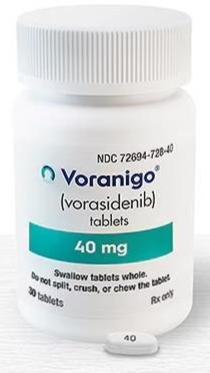
1 minute read
Health Canada recent approvals in rare disease cont'd
Finally, something new to improve the treatment of rare forms of glioma!
Health Canada approved VORANIGO in August 2024 for treating rare brain tumours called astrocytoma and oligodendroglioma. These rare forms of cancer have a mutation called IDH1 or IDH2. Servier supported the development of Voranigo, which blocks the action of IDH1 or IDH2 proteins, reducing cancer cell growth. The submission included the results from the INDIGO Trial (NCT04164901). In this clinical trial, Voranigo reduced the disease progression by more than half compared to the placebo (28% vs 54%). Also, during the study, patients treated with Vorangio didn't reach the median time to the subsequent treatment (TST). However, patients on the placebo reached TST at 18 months.
Newhopeforpeoplewithparoxysmalnocturnalhemoglobinuria
HealthCanadaapprovedVOYDEYAinJuly2024asanadd-ontostandardtherapy to treat patients with paroxysmal nocturnal hemoglobinuria (PNH) who have residual anemia The product, developed by Alexion and AstraZeneca, has been available on the USA market since April 2024 PNH is a rare, debilitating, and lifethreatening blood disorder. A mutation makes a protective protein disappear from the surface of blood cells. This anomaly causes severe anemia via massive red blood cell destruction in blood vessels. Also, patients can have blood clots due to theactivationofwhitebloodcellsandplatelets.
What about Acid sphingomyelinase deficiency?
Acid sphingomyelinase deficiency (ASMD) is a rare genetic disorder caused by a deficiency of the enzyme acid sphingomyelinase. This enzyme is essential for breaking down a fatty substance called sphingomyelin. ASMD exists on a spectrum, with severe to milder neurodegenerative forms. Accumulation of sphingomyelin in cells can cause harm to the lungs, spleen, and liver, as well as other organs, potentially leading to early death (8). XENPOZYME is an enzyme replacement therapy indicated for long-term treatment of non-central nervous system (CNS) manifestations of acid sphingomyelinase deficiency (ASMD) in pediatric and adult patients. The approval was based on two randomized trials, ASCEND and ASCEND-Peds, where XENPOZYME demonstrated meaningful improvement of the lung and the spleen with a good safety profile (9).












